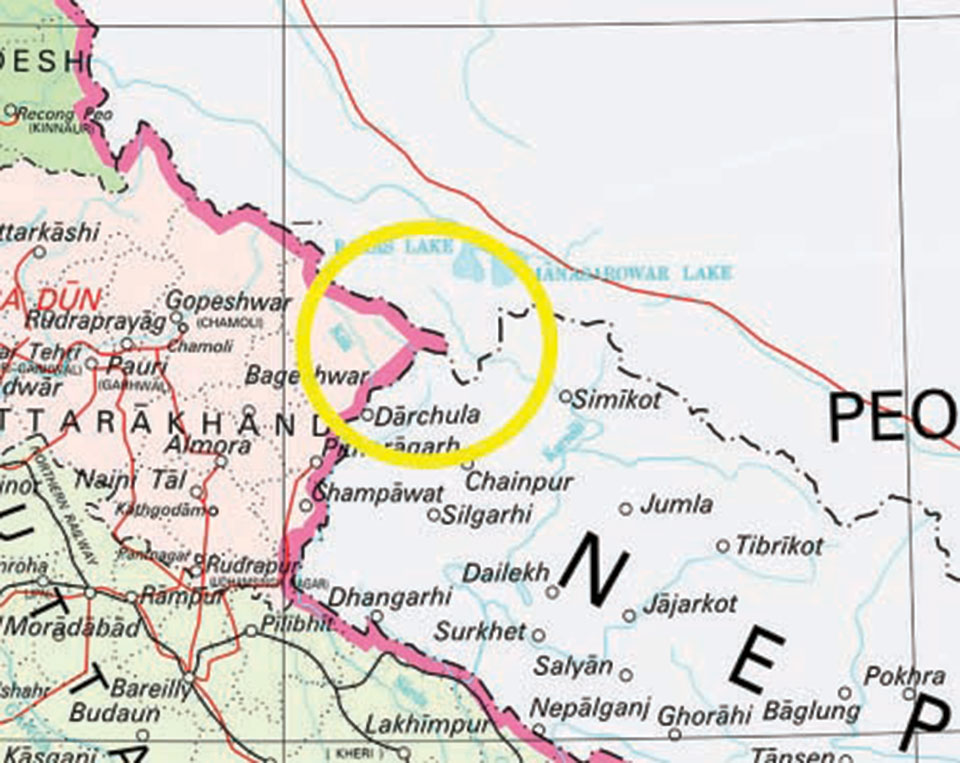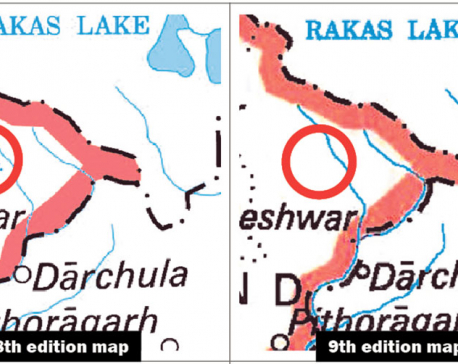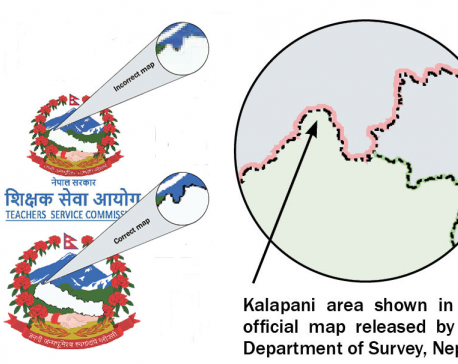
OR
News Analysis
Decades-old border issues should not fester under diplomatic politeness
Published On: December 13, 2019 07:16 AM NPT By: Kosh Raj Koirala | @KoshRKoirala

KATHMANDU, Dec 13: A silent ‘disquiet’ in relations between Kathmandu and New Delhi has surfaced ever since India released its new political map in early November, incorporating some territories belonging to Nepal along the latter’s western border. The move by the Indian side to include in their map Kalapani and other territories that lie to the east of the Mahakali River has sparked a series of protests across this country. These protests are ongoing in different parts of Nepal.
In view of the sensitivity of the issue and the ramifications it can have on bilateral relations, the Nepal government earlier requested the Indian side for an early meeting of a foreign secretary-level mechanism to resolve the issue with due urgency. While Nepali ambassador to India Nilamber Acharya held a meeting with Indian Foreign Secretary Vijay Gokhale to put forth Nepal’s request, a diplomatic note later sent by the Ministry of Foreign Affairs (MoFA) also made the same request, drawing the attention of the Indian government to the matter.
But the Indian side does not appear interested in discussing the issue any time soon even as Nepal has been awaiting an Indian response for over a month now. Answering a query by a journalist about a meeting of the foreign secretary-level mechanism during a regular press conference held at his office in New Delhi Thursday, Indian External Affairs Ministry Spokesperson Raveesh Kumar said he was not in a position to say anything about a date for a border meeting between Nepal and India.
Although Kumar said that a meeting of the foreign secretary-level mechanism would be finalized through diplomatic channels, his remarks indicate a degree of reluctance among the political leadership in Delhi to talk about the issue, at least for now. This reluctance certainly does not augur well for bilateral relations, especially as these relations are gradually returning to normal after reaching a historic low during the unofficial economic embargo that India clamped on Nepal in 2015-16.
The issue of Kalapani and other territories on the western border is nothing new. Both countries have recognized this time and again and even agreed to resolve matters through the foreign secretary-level mechanism during the third meeting of the Joint Commission (JC) – a bilateral mechanism mandated to review all aspects of bilateral relations – held in 2014. These issues have been reiterated on a number of occasions including in joint statements issued by the two countries in the past.
But now is a highly opportune time to work toward settling the border issues once and for all, and this mainly for two important reasons:
First, both the countries have governments with strong public mandates and the requisite strength in their parliaments to ratify and bring into implementation any agreement that may be reached. Negotiations over border issues are probably the most complicated between any two countries. Not surprisingly, such negotiations may entail some give-and-take as well.
What is required is strong political leader in power that can not only command wide public support, but also has the numerical strength to ratify any agreement through parliament. Both Prime Minister KP Oli and Indian Prime Minister Narendra Modi currently command such political strength.
Secondly, there is a national political consensus in Nepal in favor of holding negotiations with India without further delay and resolving the issue of Kalapani once and for all – something that did not exist in the past. Both ruling and opposition parties are unanimous that the issue needs to be resolved through diplomatic negotiations and on the basis of historical evidence and relevant treaties that define the Nepal-India border. It was in fact because of the lack of national political consensus on the need for negotiations on various crucial occasions in the past that consigned this issue to the back burner for so long. This provided an opportunity for a section of political parties and groups to exploit such a crucial agenda for soliciting public support.
Since the border issues have been one of the main irritants in bilateral relations, it is high time the political leadership of both countries took necessary initiative to convene early a meeting of the relevant mechanisms and start negotiations afresh. “While it is good to start negotiations at the level of foreign secretary or foreign minister, it is important for the final authorities themselves to talk to each other to resolve these complicated issues,” argues former foreign minister Ramesh Nath Pandey. “There is no better time for this than now.”
Nepal and India have already jointly finalized strip maps covering 98 percent of their border. Although the Indian side has repeatedly insisted that Nepal sign the strip maps that have been settled by the Boundary Working Group, the Nepali side has rejected the proposal, while maintaining that it will sign the strip maps only after all outstanding boundary issues including Kalapani and Susta are resolved. This is partly because there is apprehension on the Nepali side whether New Delhi would still be ready to talk about Kalapani and Susta.
Nevertheless, it is important for all political parties and their sister organizations to acknowledge the fact that the outstanding issues of the border are not something that can be resolved through street protests or scolding one another in public. Rather, this requires quiet diplomatic efforts through different levels and channels. As Minister for Communications and Information Technology Gokul Banskota, who is also the government’s spokesperson, rightly said during a weekly press conference on Thursday, both India and Nepal need to create an environment for negotiations by not taking a position on the issues and holding debates in public. It is in the greater interest of both countries not to let these decades-long issues lie festering under the bandage of polite diplomacy.
You May Like This

New Indian map conspicuously avoids naming Kali River
KATHMANDU, Nov 21: At a time of huge public uproar across the country after a political map of India released... Read More...

Diplomacy takes a backseat as Kalapani dominates domestic politics
KATHMANDU, Nov 25: Nepali Congress (NC) is using the ‘good old tactics from KP Oli’s handbook’ as the Kalapani dispute... Read More...

Reissue Nepal's map that includes Limpiadhura: House committee directs govt
KATHMANDU, Nov 12: The State Affairs Committee (SAC) of the House of Representatives (HoR) has directed the government to issue a... Read More...










Just In
- NRB introduces cautiously flexible measures to address ongoing slowdown in various economic sectors
- Forced Covid-19 cremations: is it too late for redemption?
- NRB to provide collateral-free loans to foreign employment seekers
- NEB to publish Grade 12 results next week
- Body handover begins; Relatives remain dissatisfied with insurance, compensation amount
- NC defers its plan to join Koshi govt
- NRB to review microfinance loan interest rate
- 134 dead in floods and landslides since onset of monsoon this year








Leave A Comment